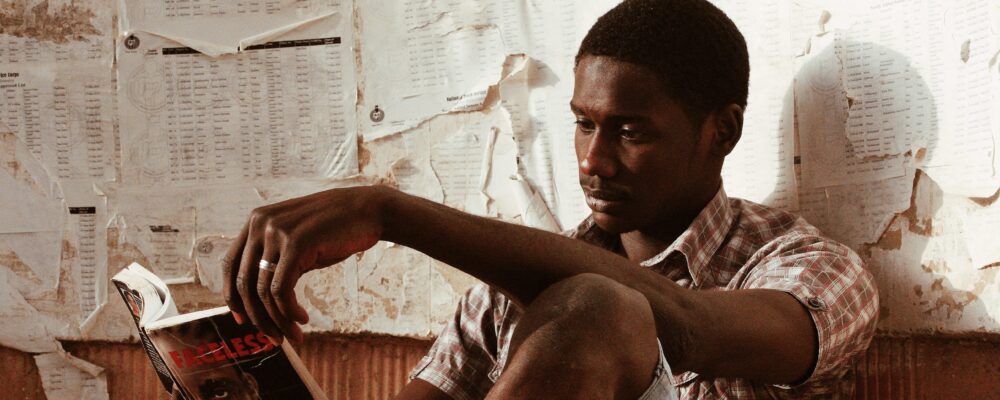
The INCLUDE team’s reading list: February 2021
One of INCLUDE’s core beliefs is that so much knowledge already exists, it just needs guiding to the right places and the right people in order to reach its full impact for policy and, ultimately, for development. This marks the second edition of our monthly list of what our secretariat members have been reading in their various areas of expertise. Whether you are seeking information to guide policy, embarking upon a piece of research, or simply interested in broadening your knowledge and staying updated on inclusive development in Africa, we hope this source can be a good starting point.
- Secondary Education, Economic Transformation, and the Future of Work in Africa – The face of the unemployed or under-employed worker in Africa is no longer the uneducated man or woman but increasingly a secondary or tertiary school graduate. In this four-part series, ACET explores what African countries should do, in light of the disruptive evolution of technology, to provide productive jobs for their large and fast-growing youth population.
- It’s Been a Year Since Schools Started to Close Due to COVID-19 – CGD data shows that while children in low-income countries have missed less in-person school over the last year than those in higher-income countries, they have lost a higher portion of lifetime education and have had less consistent access to online learning. Bringing at-risk learners back to school and helping them catch up are crucial to avoid widening gaps in education and creating knock-on effects for human capital, earnings and poverty.
- How COVID-19 can help reshape access to higher education – While the pandemic has exacerbated inequalities in access to education for the most vulnerable children, youth and adults, it has presented opportunities to improve online learning and reaching students at the last mile. This Q&A discusses SolarSPELL, a solar-panelled library that requires only a cell phone to access learning materials, helping to bridge the digital divide and continue education for those without access to internet.
- Two-Thirds of Poorer Countries Are Cutting Education Budgets Due to COVID-19 – COVID-19 is only widening the per-capita education spending gap between rich and poor countries. The education finance challenge is not only about mobilizing resources, but also about improving the effectiveness of funding.
- Economic inclusion programs: A springboard out of extreme poverty – For the first time in two decades, extreme poverty is rising around the world, as COVID-19 threatens to erode years of hard-won progress. This blogpost refers to World Bank findings from the State of Economic Inclusion Report 2021 on extreme poverty and programs to tackle this daunting world problem.
- Trends and new developments in employment services to support transitions in Sub-Saharan Africa, the Middle East and North Africa Regions – This ILO paper presents the findings of a survey undertaken in selected countries in the Sub Saharan Africa and Middle East and North Africa regions (SSA and MENA) which reviews the status of employment service provision, challenges and opportunities for their development.
- What works in rural youth employment promotion? Good practices and lessons from GIZ programs on rural youth employment – This study takes a first step in answering the question “What works in Rural Youth Employment Promotion (RYEP)?” through an analysis of the portfolio of the German Development Cooperation in technical cooperation. It analyses 11 projects featuring a range of youth employment promotion approaches in Africa in-depth.
- Youth Aspirations and the Future of Work. A Review of the Literature and Evidence – This report was undertaken as part of the ILO Future of Work project and aims to (i) review the literature on the concepts and drivers of aspirations; (ii) develop a conceptual framework that relates labour market conditions to aspirations; (iii) map the existing survey-based evidence on the aspirations of youth worldwide; and (iv) provide insights into how to improve data collection, research and evidence-based policy-making related to young persons aspirations.
- Africa Development Dynamics Report 2021: Digital transformation for quality jobs – The COVID-19 crisis strengthens the role of digitalisation in contributing to Africa’s productive transformation and in fulfilling Agenda 2063. This African Union and OECD report recommends four complementary actions for governments to drive Africa’s digital transformation and trigger large-scale job creation, including outside the digital sector.
- Education technology for effective teachers – As part of the World Bank’s Global Platform for Effective Teachers, this CGD note lays out four principles for investing in technology for effective teachers, and six aspects of teaching where technology can boost teacher performance, together with examples of tested, promising, and cautionary experiences with teacher technologies.
- The role of digital labour platforms in transforming the world of work – This ILO flagship report explores how the contemporary platform economy is transforming the way work is organized, analysing the impact of digital labour platforms on enterprises, workers and society as a whole. It draws upon surveys and interviews with some 12,000 workers and representatives of 85 businesses around the world, in multiple sectors.
- Africa’s digital transformation risks becoming trapped in geopolitical competition – It is difficult to imagine a discussion on Africa’s “post-Covid-19” recovery that excludes affordable and reliable internet access as a key priority. But digital transformation is not a neutral space and policy choices on how to implement the digital agenda in Africa are bound to be shaped by the geopolitical tech war between China and the West.
- Sourcebook on the Foundations of Social Protection Delivery Systems – This synthesis of real-world experiences and lessons learned from social protection delivery systems around the world takes a practical approach, addressing concrete “how-to” questions, and structures itself around 8 key principles that can frame the delivery system mindset.
- Shelter from the storm: The global need for universal social protection in times of COVID-19 – This Oxfam report reveals that 41% of government support during the pandemic was only a one-off payment, and almost all government support has now stopped. But some countries have shown that a universal approach to social protection is both affordable, and that it has a profound impact on reducing inequality and protecting those who need it most.
- Engaging Communities and Building Hope in Times of Crises – Shining Hope for Communities (SHOFCO) based in Kibera, Africa’s largest informal settlement, provides critical services (including WASH, SRHR, nutrition and cash transfers), community advocacy platforms and education and leadership development for women and girls in order to help local organisations and communities lead recovery and preparedness.
- Implementing innovative solutions for maternal health at scale – Private health providers play a vital role in maternal health – 40-70% of reproductive health services in LMICs are provided by local private providers – however, there are numerous barriers to integrating them fully into national or local health systems.
- Falling living standards during the COVID-19 crisis: Quantitative evidence from nine developing countries – Developing countries have faced similar challenges as richer countries, but with far fewer resources to absorb them with. This new paper, based on a survey of over 30,000 households, documents declines in employment and income beginning since March 2020 and the resulting widespread food insecurity.
- Impact of COVID-19 on businesses within informal settlements – Stories from small business owners in Mathare and Kibera on the effects of Covid policies, from having to adjust working hours, to finding new sources of income, show the urgent need to cushion this sector and help businesses survive periods of crisis.
- Identifying key youth trends before, during and after the pandemic – The direct impacts on the Covid-19 crisis on youth (in particular, on (mental) health, education and employment opportunities) are systemic, deep and severe. This article builds towards IDS’ upcoming webinar series on ‘Ensuring decent work and political inclusion for young people’, which will address both the ‘histories’ and ‘futures’ of youth in SSA and MENA countries.
- How high-profile COVID-19 deaths in Africa could change health systems – So far in 2021, South Africa, Eswatini, Zimbabwe, and Malawi have all lost cabinet ministers to the pandemic. Politicians often bypass local health systems and seek care elsewhere, but COVID-19 has meant that elites have had to rely on overtaxed health systems int heir own countries. There are hard lessons to learn on the importance of prioritizing domestic health financing and having functioning public health delivery services.
- Increasing tax revenue in developing countries – Closing the tax gap between lower and higher income countries is important for spending on infrastructure and good governance. This World Bank article looks at the role of information, formalisation, tax morale and compliance in boosting tax revenue in developing countries.
- Domestic revenue mobilisation in low-income countries: where to from here? – This CGD paper shows the considerable potential for raising more revenues from domestic sources in developing countries to finance development, but argues that this would require strong political leadership to overcome resistance from vested interests.
- Domestic Resource Mobilization and Economic Recovery in Africa – Countries’ ability to deliver critical public services – as part of current economic stimulus packages and beyond – likely depends on levels of domestic resource mobilization. This paper highlights 8 ways open government reforms can help LLMICs progress in open budgets, revenue management, and public spending.
- Debt sustainability and financing for development: A key post-COVID challenge – Even prior to the COVID-19 pandemic, sovereign debt across sub-Saharan Africa had been increasing. In the scramble to finance development agendas in a difficult post-COVID environment, effective management of sovereign debt, and efficient domestic resource mobilization and public spending, are imperative, according to this Brookings post.
- Creating Effective Research-Policy Partnerships for COVID Response and Beyond – Five key lessons from a conversation hosted by IPA and the CGD on informing partnership approaches for evidence-based policymaking throughout the COVID response and beyond.
- Aid data 2019–2020: Analysis of trends before and during Covid – This brief compares the OECD DAC’s official development assistance (ODA) data for 2019 with the most recent IATI data (Jan-Nov 2020). The analysis shows a historic flatlining of ODA growth followed by a sharp decline in aid as the crisis hit. It also reveals a shifting balance of aid from grants to loans, and changes in the sector allocation, policy focus and geographic targeting of aid.
- Did Africa turn a corner in 2020 or did it just dodge a bullet? – In 2020, Africa had shown the world it could handle its problems on its own; in 2021, if its policymakers started creating jobs, Africans could again wow the world with a quick recovery and structural renewal.
- Responding to protracted displacement in an urban world – IIED is leading a study that will compare the experiences of refugees and internally displaced persons (IDPs) in cities and camps in four countries – Afghanistan, Ethiopia, Jordan and Kenya. With the ultimate goal of improving self-reliance, wellbeing and the productive livelihoods of refugees, returnees and IDPs, this research examines how cities can foster displaced people’s local integration while benefiting host governments and communities.
We encourage anyone from our platform, close network and wider audience to get in touch with recommendations for this reading list and to help us with our goal of sharing and disseminating knowledge. Please mail your suggestions to includeplatform.net with the subject “Contribution to INCLUDE reading list“.


